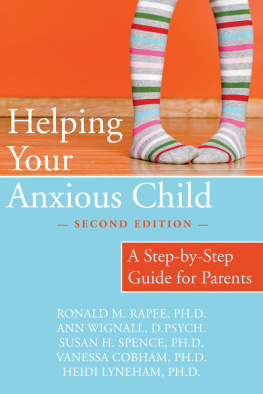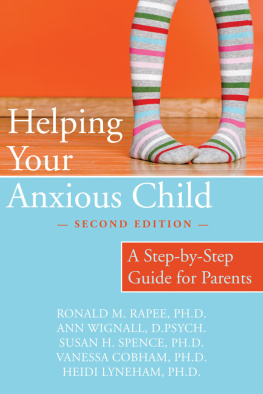References
Abbott, B. B. 1985. Rats prefer signaled over unsignaled shock-free periods. Journal of Experimental Psychology: Animal Behavior Processes 11 (2):21523.
American Psychiatric Association. 2000. Diagnostic and StatisticalManual of Mental Disorders (DSM-IV-TR). 4th ed. (text rev.) Washington, DC: American Psychiatric Association.
Arnold, M. 1998. Matthew Arnold: Selected Poems. New York: Everyman.
Badia, P., J. Harsh, and B. Abbott. 1979. Choosing between predictable and unpredictable shock conditions: Data and theory. Psychological Bulletin 86 (5):110731.
Beckett, S. 1996. Nohow On: Company, Ill Seen Ill said, Worstward HoThree Novels. New York: Grove Press.
Bishop, E. 1984. Elizabeth Bishop: The Complete Poems, 19271979. New York: Farrar, Straus, and Giroux.
Bruce, L. 1992. How to Talk Dirty and Influence People: An Autobiography. New York: Fireside.
Burns, R. 1991. Poems and Songs. New York: Dover Thrift.
Calleo, J., and M. Stanley. 2008. Anxiety disorders in later life: Differentiated diagnosis and treatment strategies. Psychiatric Times 25 (8). www.psychiatrictimes.com/anxiety/article/10168/1166976. Accessed 14 July 2009.
Centers for Disease Control and Prevention, National Center for Inquiry Prevention and Control. n.d. Web-based injury statistics query and reporting system (WISQARS). www.cdc.gov/injury/wisqars/index.html (accessed May 14, 2009).
Chase, D. 2002. The Sopranos: Selected Scripts from Three Seasons. New York: Home Box Office.
Chiles, J. A., and K. D. Strosahl. 2005. Clinical Manual for Assessment and Treatment of Suicidal Patients. Arlington, VA: American Psychiatric Publishing, Inc.
Dickinson, E. 1976. The Complete Poems of Emily Dickinson. Ed. T. H. Johnson. New York: Back Bay Books.
Elkins, C. 2002. Daedalus Rising. Greenville, SC: Emrys Press.
Eliot, T. S. 1991. Collected Poems, 19091962. Orlando, FL: Harcourt Brace and Company.
Frankl, V. E. 1959. Mans Search for Meaning: An Introduction to Logotherapy. Boston, MA: Beacon Press.
Kabat-Zinn, J. 1994. Wherever You Go, There You Are: Mindfulness Meditation in Everyday Life. New York: Hyperion.
Kessler, R. C., W. T. Chiu, O. Demler, and E. E. Walters. 2005. Prevalence, severity, and comorbidity of twelve-month DSM-IV disorders in the National Comorbidity Survey Replication (NCS-R). Archives of General Psychiatry 62 (6):61727.
Kessler, R. C., K. A. McGonagle, S. Zhao, C. B. Nelson, M. Hughes, S. Eshleman, H. U. Wittchen, and K. S. Kendler. 1994. Lifetime and 12-month prevalence of DSM-III-R psychiatric disorders in the United States. Results from the National Comorbidity Survey. Archives of General Psychiatry 51 (1):819.
Moore, S. 1985. Let This Mind Be in You: The Quest for Identity Through Oedipus to Christ. Minneapolis, MN: Winston Press.
Schmich, M. 1997. Advice, like youth, probably just wasted on the young. Chicago Tribune, June 1.
Shakespeare, W. 1996. The Riverside Shakespeare. 2nd ed.Ed. G. B. Evans and J. J. M. Tobin. New York: Houghton Mifflin Company.
Sinatra, F. 2008. Sinatra: Nothing but the Best. Los Angeles: Reprise Records.
Tennyson, A. L. 1985. Tennyson: Selected Poetry. New York: Penguin Books.
Whitman, W. 1998. The Complete Poems of Walt Whitman. London: Wordsworth Editions.
Wood, J. V., W. Q. Perunovic, and J. W. Lee. 2009. Positive self-statements: Power for some, peril for others. Psychological Science 20 (7):86066.
Yeats, W. B. 1996. The Collected Poems of W. B. Yeats. 2nd rev. ed.Ed. R. J. Finneran. New York: Scribner.

Publishers Note
This publication is designed to provide accurate and authoritative information in regard to the subject matter covered. It is sold with the understanding that the publisher is not engaged in rendering psychological, financial, legal, or other professional services. If expert assistance or counseling is needed, the services of a competent professional should be sought.
Distributed in Canada by Raincoast Books
Copyright 2010 by Kelly G. Wilson & Troy DuFrene
New Harbinger Publications, Inc.
5674 Shattuck Avenue
Oakland, CA 94609
www.newharbinger.com
All Rights Reserved
Acquired by Catharine Sutker; Cover design by Amy Shoup; Edited by Nelda Street
What We Knew, by Carolyn Elkins, from Daedalus Rising, Emrys Press, 2002, reprinted by permission of the author.
Epub ISBN: 9781608820481
The Library of Congress has Cataloged the Print Edition as:
Wilson, Kelly G.
Things might go terribly, horribly wrong : a guide to life liberated from anxiety / Kelly G. Wilson and Troy DuFrene.
p. cm.
Includes bibliographical references.
ISBN 978-1-57224-711-6
1. Anxiety. 2. Anxiety--Treatment. 3. Acceptance and commitment therapy. I. DuFrene, Troy, 1972- II. Title.
BF575.A6.W55 2010
152.46--dc22
2010000225
For my wife Dianna, after thirty years, on this very day, I choose you.
K. G. W.
To chance, because sometimes things go wonderfully, fabulously right.
T. D.
Contents

Things We Want to Say
Dont let the covers fool you. Books, like lives, are wiggling, evolving, living things. Theyre not bound by pages or authors or schools of thought. Theyre not born when theyre printed; in fact, they only start to live once theyre read. So first of all, we thank you, reader. You dignify this work we do, and were sincerely grateful for your time and attention.
Acceptance and commitment therapy (ACT) is fundamentally and significantly a community effort. Our thanks go out to everyone who contributes to this work, its development, and its dissemination. In particular, thanks to the folks in Kellys lab at Ole Miss and to all of our teachers, wherever they may now be.
Were grateful to the folks at New Harbinger for shepherding the book through its long and tortuous gestation, especially to Catharine Sutker, Jess Beebe, and Nelda Street. And we particularly thank Heather Mitchener, who has a future in talking would-be jumpers down from ledges if this whole editorial thing doesnt work out for her.
Finally, and most importantly, we offer our thanks and love to our familiesto Dianna, Chelsea, Emma, Sarah, and the restwhose indulgence and support make it possible for us to get up to these shenanigans, scribbling books when, by rights, we should be paying more attention to them.
Things Might Go Terribly, Horribly Wrong
But, Mousie, thou art no thy lane,
In proving foresight may be vain;
The best-laid schemes o mice an men
Gang aft agley,
Anleae us nought but grief an pain,
For promisd joy!
Robert Burns, To a Mouse
One Tuesday morning in 2001, a wine salesman was getting ready for work in his Berkeley, California, apartment. After showering and shaving, he put on an ill-fitting pin-striped suit, scuffed black loafers, and a blue tie that, he noted with alarm, had picked up a grease stain at lunch the day before. Because he worked in the city of San Francisco and the traffic from Berkeley into the city could sometimes be bad, he was in the habit of getting up early to avoid the worst of it. His girlfriend, with her more congenial commute, could afford an extra hour of sleep and was still in bed.















